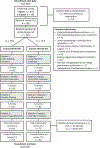Targeting emotional regulation using an Internet-delivered psychological intervention for cancer survivors: A randomized controlled trial
- PMID: 37437963
- PMCID: PMC10710879
- DOI: 10.1111/bjhp.12679
Targeting emotional regulation using an Internet-delivered psychological intervention for cancer survivors: A randomized controlled trial
Abstract
Objectives: This trial assessed the efficacy of an emotion-focused, modular, Internet-delivered adaptation of the Unified Protocol (UP) in improving cancer survivors' emotion regulation strategies.
Design: A two-arm randomized controlled trial (1:1) was used to compare the efficacy of two Internet-based interventions: UP-adapted CanCope Mind (CM) and lifestyle-focused active control CanCope Lifestyle (CL).
Methods: N = 224 cancer survivors randomized to CM or CL were assessed at baseline, between-modules, at post-intervention and 3-month follow-up on emotion regulation outcomes targeted by each CM module (Module 1: beliefs about emotions; Module 2: mindfulness; Module 3: cognitive reappraisal skills, catastrophizing, refocus on planning; Module 4: experiential avoidance). Primary analyses were intention-to-treat linear regressions using Fisher randomization tests for p-values and intervals were used to compare groups with standardized mean difference (SMD) effect sizes.
Results: CanCope Mind participants (n = 61 completers) experienced moderate-to-large improvements (SMDs from .44-.88) across all outcomes at post-intervention. CM's effects were larger than CL's (n = 75 completers) immediately post-intervention and at 3-month follow-up for beliefs about emotions, mindfulness, cognitive reappraisals and experiential avoidance (all p's < .05). CM experienced greater improvements in catastrophizing immediately post-intervention, with a trending effect at follow-up. However, we could not reject the null hypothesis of identical between-group effects for refocusing on planning both immediately post-intervention and at follow-up. Exploratory analyses revealed inconsistent between-module effects.
Conclusions: In its entirety, CM is a promising intervention for improving and maintaining cancer survivors' adaptive emotion regulation, especially for mindfulness and experiential avoidance. This may have important clinical implications for promoting cancer survivors' emotional functioning and general well-being.
Keywords: Internet-delivered interventions; cancer survivors; emotion regulation; psycho-oncology; transdiagnostic; unified protocol.
© 2023 The Authors. British Journal of Health Psychology published by John Wiley & Sons Ltd on behalf of British Psychological Society.
Figures


References
-
- Appleton A, & Kubzansky D (2014). Emotion regulation and cardiovascular disease risk. In Gross JJ, Handbook of emotion regulation (2nd ed, pp. 596–612). Guilford.
-
- Australian Institute of Health and Wellness, C. (2021). Cancer data in Australia https://www.aihw.gov.au/reports/cancer/cancer-data-in-australia/contents...
-
- Barlow DH, Farchione TJ, Sauer-Zavala S, Murray-Latin H, Ellard K, R., Bullis JR, Bentley KH, Boettcher HT, & Cassiello-Robbins C (2018). Unified protocol for transdiagnostic treatment of emotional disorders: Therapist guide (Second edition). Oxford University Press.
Publication types
MeSH terms
Grants and funding
LinkOut - more resources
Full Text Sources
Medical

